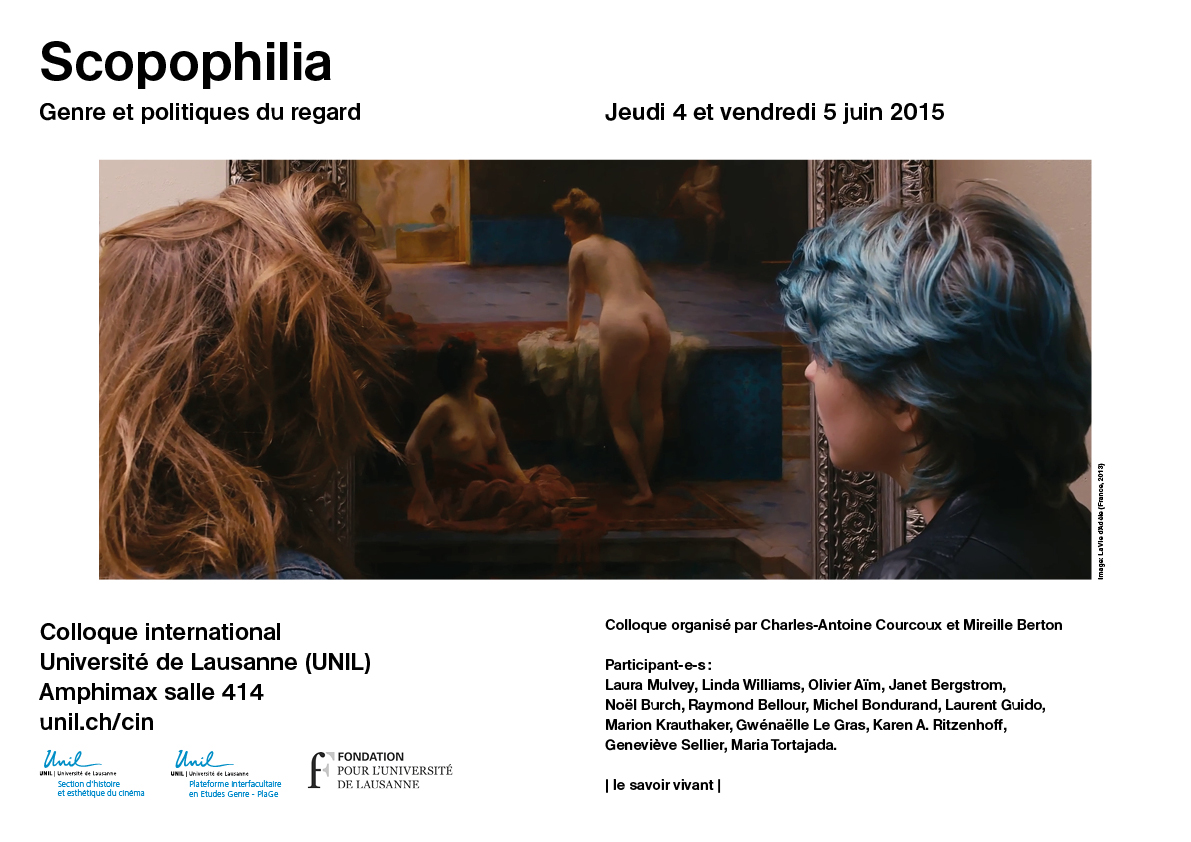
Scopophilia. Genre et politiques du regard
Colloque international, 4 et 5 juin 2015, Université de Lausanne
Organisé sous la direction de Charles-Antoine Courcoux et de Mireille Berton
Depuis la parution, en 1975, de l’article de Laura Mulvey « Visual Pleasure and Narrative Cinema », le paramètre du regard en général et celui de la scopophilie en particulier n’ont eu de cesse de prendre de l’importance au sein des travaux qui se sont attachés à mettre en lumière la propension du cinéma dominant à structurer les relations de pouvoir entre les genres sur un mode androcentriste et hétéronormatif. En se donnant pour objet le rôle politique du regard et du plaisir qu’il suscite dans l’instauration des rapports de genres aujourd’hui, ce colloque ne vise ni à réhabiliter le paradigme sémio-psychanalytique émoussé qui a caractérisé l’émergence de cette question ni à rendre compte des nombreux débats productifs auxquels elle a donné lieu, mais à l’interroger à nouveaux frais via son inscription dans les contextes filmiques et théoriques contemporains. Il s’agit ainsi de proposer une réflexion axée, d’une part, sur les apports que les approches gender actuelles, mais queer également peuvent avoir pour le renouvellement de cette question et, d’autre part, sur la (re)configuration genrée des regards au sein des productions filmiques et télévisuelles contemporaines.
Participant-e-s : Laura Mulvey, Linda Williams, Olivier Aïm, Janet Bergstrom, Noël Burch, Raymond Bellour, Michel Bondurand, Laurent Guido, Marion Krauthaker, Gwénaëlle Le Gras, Karen A. Ritzenhoff, Geneviève Sellier, Maria Tortajada.
Scopophilia: The Gendered Politics of the Gaze
International conference, June 4th-5th 2015, University of Lausanne, Switzerland
Organized by Charles-Antoine Courcoux and Mireille Berton
In 1975, with “Visual Pleasure and Narrative Cinema,” Laura Mulvey placed the question of the pleasure of looking (and its articulation with the narrative process) at the heart of the first political theorization of gender relations in cinema. Mulvey showed that, far from being merely an aesthetic issue, the gaze was also inextricably political in that it served as the nodal variable in a symbolic. This symbolic was conducive to structuring power relations—between women and men of course, but also and more importantly between the masculine, the feminine and all types of gender identifications likely to deviate from this dichotomy. Since its publication, this seminal contribution has been discussed, nuanced, reformulated and expanded extensively, sometimes by the theorist herself. As parameters, the gaze (in general) and scopophilia (in particular) have gained increasing importance in works emphasizing the propensity of dominant cinema to structure gender/power relations on a heteronormative and androcentric mode. This conference thus takes as its object the political role of the cinematic gaze (and of the pleasure it evokes) in the formation of gender relations today, that is to say, in the power dynamics threading these relations. In so doing, we do not mean to reinstate the relatively outdated semio-psychoanalytic paradigm that characterized the emergence of this issue or account for the many productive discussions it gave rise to. Rather, we would like to question it anew by confronting it to contemporary cinematic and theoretical contexts.
Participants : Laura Mulvey, Linda Williams, Olivier Aïm, Janet Bergstrom, Noël Burch, Raymond Bellour, Michel Bondurand, Laurent Guido, Marion Krauthaker, Gwénaëlle Le Gras, Karen A. Ritzenhoff, Geneviève Sellier, Maria Tortajada.
PROGRAMME
JEUDI 4 JUIN - Amphimax/414
Matin
9h : Accueil
Présidence de séance : Charles-Antoine Courcoux
9h10 : Introduction par Charles-Antoine Courcoux
9h45 : Laura Mulvey (University of London, Birkbeck)
Becoming History : Spectatorship, Technology and Feminist Film Theory
10h45 : Pause café
11h : Laurent Guido (Université de Lille 3)
Danse, cinéma, théâtralité : le corps exhibé au regard des attractions
11h45 : Maria Tortajada (Université de Lausanne)
Tableaux de femmes. Du corps féminin en dispositif de vision. Retour à Luis Buñuel
12h30 : Pause de midi
Après-midi
Présidence de séance : Geneviève Sellier
14h : Noël Burch (Université de Lille 3)
« Look into my Eyes » Said the Computer
14h45 : Raymond Bellour (Centre national de la recherche scientifique, C.R.A.L.)
Les avatars du double narcissique
15h30 : Pause
15h45 : Olivier Aïm (Celsa, Université Paris-Sorbonne)
Panscopophilia : réflexions sur le principe de totalité dans les régimes de regard de quelques dispositifs audiovisuels contemporains
16h30 : Mireille Berton (Université de Lausanne)
Dispositifs de la cure psychanalytique en regard : A Dangerous Method et In Treatment
17h15 : Conclusion
VENDREDI 5 JUIN - Amphimax/414
Matin
9h : Accueil
Présidence de séance : Mireille Berton
9h15 : Linda Williams (University of California, Berkeley)
Sex is Too Important to Leave to the Pornographers : Scopophilia and the « Sexually Explicit »
10h15 : Geneviève Sellier (Université Bordeaux Montaigne)
Mulvey au prisme du cinéma français : quelle politique du regard ?
11h : Pause café
11h15 : Janet Bergstrom (University of California, Los Angeles)
Oblique Strategies : "Claire Denis" with Agnès Godard (Beau Travail, 35 Shots of Rum)
12h : Pause de midi
Après-midi
Présidence de séance : Laurent Guido
13h45 : Karen A. Ritzenhoff (Central Connecticut State University)
Broken Reflections of the Queer Self : Mirror Images in Darren Aronofsky’s Black Swan
14h30 : Gwénaëlle Le Gras (Université Bordeaux Montaigne)
The Congress ou la mise à l’épreuve du male gaze ?
15h15 : Pause
15h30 : Marion Krauthaker (University of Leicester)
Etouffer le rire de la Méduse, détourner son regard : Le Bleu est une couleur chaude de la BD au film
16h15 : Michel Bondurand (Université Paris III, Sorbonne Nouvelle)
Le regard comme vecteur de renégociation raciale : le spectateur blanc et The Siege
17h : Conclusion

